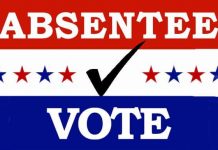Greg Buelow, the public information officer for the City of Cedar Rapids, responded to The Iowa Standard Friday evening. We discussed the cancellation of the Back the Blue Rally that was planned for Saturday in Cedar Rapids.
You can read about the organizer’s thoughts on the cancellation here.
Buelow said he has never directly talked with or met Michael Lambert, the rally’s organizer. Officers and commanders, Buelow said, have been working with the organizers.
“At the end of the day, the decision of whether or not to have a rally or a march or a protest – whatever you want to call it – is up to the event organizers,” Buelow said. “The police department, and I think there’s a lot of evidence of this over the past several weeks, supports individuals’ rights to peaceably assemble. They can choose to do their rallies or their protests or their marches in a manner that we hope is safe, but then most importantly, peaceful.”
Buelow said his understanding is that Back the Blue organizers were told the preference was to use the sidewalks.
“Obviously when people use the streets then we have an issue not only with the safety of the protestors but also the motorists or bicyclists who are trying to use the streets for transportation,” he said. “When you get those two together, they don’t mix and officers have to do some kind of traffic control.”
Buelow said the department had the same conversation with advocates for social justice, Black Lives Matter groups in Cedar Rapids.
“Obviously if they choose to go on the street, then the police department will have to provide some type of traffic control to make sure the motorists and protestors don’t mix and neither side gets hurt,” he said. “Someone called me today, a member of the public, and said ‘Hey, I just want to hear directly from you guys on what’s going on? How come there’s no escort?’
“The police department hasn’t given any particular protest an escort. Now, it may appear that way, but what happens is once a protest goes out on the streets, then officers sent deploy in such a manner to divert traffic so they don’t run into protestors. We’ve seen it all across the country when motorists and protestors are on the same street. Then you have problems.”
While Lambert says he was told rallygoers would be cited or arrested for impeding traffic if they walked in the street, Buelow said it must have been a miscommunication or misunderstanding. Buelow admitted that George Floyd protestors did indeed lay down in the road for 8-9 minutes.
“Our preference is not to have anyone in traffic,” Buelow said. “It was organized. They laid in the road for a certain period of time. They wanted to make a statement, but then they got up and went again. Obviously if the protestors tomorrow would’ve done the same thing, I don’t think you would’ve seen any of those cited as well.”
None of those protesters were cited or arrested for impeding traffic.
In addition, protesters stood on the roof of the police headquarters earlier this year in Cedar Rapids.
“For a short period of time, three individuals were on the roof of the police station. The chief has accepted responsibility for that. He made the conscientious decision that we did not want to be part of the story,” Buelow said. “We understood that they were angry, upset and displaying some emotions. The fortunate thing is that there was just some minor vandalism. They drew some horns on the ‘o’ of police. It literally washed right off.
“Here’s the alternative – send police officers out there, start having kids running from them while they’re on the roof – that’s not worth it.”
Again, there were no charges.
“There’s no point of police becoming the story in this,” Buelow said. “Let them have the opportunity to protest – people were very angry, they’re still angry, they’re still upset, some are scared. You can go through any of the emotions that people have. The way we’ve viewed it is we provided them with some space to be able to do what they felt was necessary to protest.”
While not everyone may agree with tactics, Buelow said what matters is that the protest remains peaceful.
“The police department provides what services are needed to make sure they’re able to exercise their First Amendment rights,” Buelow said.
Another stipulation was parking vehicles on a grassy area on First Avenue and First St. West. Buelow said that’s a no-parking area and the city has had a lot of issues with cars parking there the last several weeks.
“It’s caused a lot of loitering and back up of traffic,” he said. “It’s city-owned property and we really don’t want people tearing up all that grass.”
Again, Buelow said there might have been some misunderstanding that they thought they could park there, but the department told them no.
“We don’t make exceptions for protests to allow you to park on that grassy area if we’re telling the public they can’t do it on other nights,” he said.
Ultimately, Buelow said the situation is “unfortunate.”
“I’ve heard from several people saying that we don’t understand why the police department or the city would tell them they can’t have a protest,” Buelow said. “I just think that’s the wrong message. I don’t think that was ever conveyed. If that’s what somebody felt was said, it is a misunderstanding. I can’t reiterate it enough. The department and the city have gone to great lengths to make sure that peaceful protests, peaceful assemblies guaranteed under the First Amendment, and we’re going to do whatever’s necessary to allow people to exercise that right.”
As for this incident, Buelow encourages Lambert and others frustrated reach out to the department and set up a meeting with the chief.
Permits were not required, which is the same thing Lambert told The Iowa Standard.
“It clearly shows our department is not showing favoritism to one cause if nobody is really 100 percent happy with how things go,” Buelow said. “It wasn’t our decision. Nobody in this group has done anything wrong. I’m disappointed if they feel they can’t have a protest. They could still have one tomorrow.”











